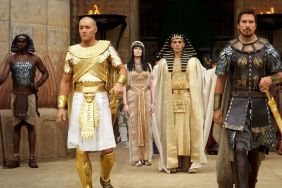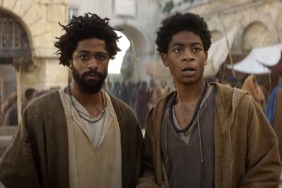The Bible is one of the most widely read books in the world. And that’s been true for several hundred years. Whether you believe in the text or not, it’s out there. The stories of the Bible are so ubiquitous that almost everyone knows the broad strokes of its myths and legends.
For almost as long as there have been movies, Hollywood has been mining those Biblical stories for its blockbuster films. The tales of Jesus Christ, Noah, and Moses have been particularly popular material for writers, actors and directors to dive into. It’s no coincidence that some of the earliest epic movies happened to be inspired by the Bible. Some of those Bible stories are ripe with dramatic potential and unforgettable visuals.
Although large scale Biblical epics are now rarer than they were fifty or sixty years ago, Hollywood still has an attraction to them. This year alone, there are two big blockbuster movies inspired by the Bible. Noah revisited the legend of Noah’s Ark, while director Ridley Scott’s upcoming film, Exodus: Gods and Kings, will explore the escape of the Hebrews from Egypt.
Christian Bale is playing Moses in Exodus: Gods and Kings, with Joel Edgerton as his rival and adoptive brother, Ramesses II. The trailers for the movie have already teased some of the most memorable moments from that tale, including the ten plagues of Egypt and the parting of the Red Sea… all of which will be depicted with modern special effects.
Ahead of the release of Exodus: Gods and Kings on December 12, ComingSoon has assembled a list of ten of the most memorable Biblical epics in Hollywood history. Not all of these films are directly based on the Bible, but they all owe their existence to that perennial best-seller.
Click Full Screen to read each entry!
10 Memorable Biblical Epics
-
Intolerance (1916)

Nearly 100 years ago, iconic filmmaker D. W. Griffith released one of the few Biblical epics during the silent era of movies. Intolerance isn’t entirely dedicated to the story of Jesus Christ and his death. In fact, that story is only a small part of the film’s four narratives that were loosely linked by the theme of intolerance throughout history.
Apparently, Griffith was stung by accusations that he was a huge racist, because his prior film, The Birth of a Nation, made the Ku Klux Klan seem heroic and noble. Demonstrating the evils of intolerance was possibly Griffith’s way of atoning for that.
Intolerance jumps around through four different stories throughout the film. Think of it as the Cloud Atlas of its day, except Intolerance was a bigger flop and the most expensive film of its time.
Still, Intolerance is also one of the first true epics in film. Although its most lasting legacy is the creation of fake eyelashes for actress Seena Owen.
-
Quo Vadis (1951)

Quo Vadis isn’t as well known as some of the other films on this list, but it was released near the beginning of Hollywood’s busiest period for Biblical epics. Based on the novel of the same name by Henryk Sienkiewicz, Quo Vadis takes place decades after the birth of Christianity as the mad Roman emperor, Nero (Peter Ustinov) persecutes the early Christians.
But at it’s heart, Quo Vadis is the love story of a Roman citizen, Marcus Vinicius (Robert Taylor) and Lygia (Deborah Kerr), a hostage who converted to Christianity with the Roman family that cared for her. In Marcus’ pursuit of Lygia, he too converts to Christianity and faces the cruelty of Nero’s actions along with Lygia and the others who share their religion.
Director Mervyn LeRoy actually filmed Quo Vadis in Rome, which helped give the movie a distinctive flavor. Back in 1951, Quo Vadis was the biggest blockbuster of the year and one of the most successful epic films to that point in time.
But unless a major Hollywood studio wants to remake this story, Quo Vadis will be remain overlooked and largely forgotten by modern audiences.
-
The Ten Commandments (1956)

Legendary director Cecil B. DeMille’s adaptation of The Book of Exodus was the second film called The Ten Commandments. It also happens to be one of the all-time Hollywood blockbusters when adjusted for inflation.
Charlton Heston portrayed Moses, the adoptive son of the Pharaoh who discovered his true heritage as a Hebrew while pushing for better treatment of his real people. Yul Brynner played Ramses II, Moses’ adoptive brother and later, his bitter rival.
In terms of spectacle, The Ten Commandments had several memorable moments including the ten plagues, the parting of the Red Sea and Moses’ descent with the stone tablets inscribed by God. Those scenes were done with practical effects decades before CGI made it a lot easier for filmmakers.
-
Ben-Hur (1959)

Director William Wyler’s film wasn’t the first (or the last) adaptation of Lew Wallace's Ben-Hur: A Tale of the Christ, but this is the one that everyone remembers. Obviously, the movie wasn’t directly based on The Bible, but Wallace’s book was a popular Christian historical drama novel in the late 19th Century.
For this adaptation, Charlton Heston played Judah Ben-Hur, a Jewish prince who is unjustly sentenced to slavery before he rises to become a Roman citizen and a champion charioteer while seeking his revenge against Messala (Stephen Boyd), a former friend who had betrayed him.
Ben-Hur won 11 Oscars, including Best Picture. But it’s best known for its climactic chariot race, Heston’s performance and the guest appearance by Jesus Christ (Claude Heater), who inspires Ben-Hur to become a Christian.
A remake of Ben-Hur is coming in 2016 from MGM, Paramount and the producers of History’s The Bible, Mark Burnett and Roma Downey.
-
Jesus Christ Superstar (1973)

Andrew Lloyd Webber and Tim Rice’s Jesus Christ Superstar was a successful Broadway play in the early ‘70s and it is still constantly being performed around the world in 2014. For the first feature film adaptation of Jesus Christ Superstar, director Norman Jewison used a group of religious re-enactors as the framing sequence for the story of Jesus (Ted Neeley) and Judas (Carl Anderson).
While Jesus is one of the focal points of this story, Judas gets a very sympathetic portrayal as he doubts Jesus and struggles with betraying him. It should also be mentioned that Jesus Christ Superstar is a “rock opera,” so a lot of the big emotional moments come during the musical numbers.
Because of the play’s enduring popularity, there’s still talk of another film adaptation of Jesus Christ Superstar. But aside from a direct-to-video Jesus Christ Superstar adaptation in 2000, that hasn’t happened yet.
-
Monty Python's Life of Brian (1979)

Life of Brian is definitely not a Biblical epic, but it is probably the best parody of a Biblical epic that we’re ever going to get.
At the famous stable in Bethlehem, a baby named Brian is briefly mistaken for Jesus Christ by the Three Wise Men. When Brian (Graham Chapman) grows up, he is once again mistakenly identified as the Messiah despite his desperate attempts to get the people of Judea to think for themselves.
As a religious satire, Life of Brian is blindingly funny with several memorable quotes and scenes. But nothing tops the darkly comic finale, as Brian and his fellow condemned break out into a song while slowly dying of crucifiction.
“Always Look on The Bright Side of Life.”
-
The Last Temptation of Christ (1988)

There was a time when it was almost unthinkable to make a movie that challenged the tenets of Christianity in any way. Martin Scorsese’s The Last Temptation of Christ deeply offended religious conservatives by presenting a very flawed and human Jesus Christ (Willem Dafoe).
As adapted from Nikos Kazantzakis' novel of the same name, The Last Temptation of Christ presented Jesus’ ultimate challenge: a vision of a life in which he was not the Son of God. A life in which he could be happy. Freed from his preordained death, Jesus gets to consummate his marriage with Mary Magdalene (Barbara Hershey), have kids, marry again and have more children while living for several decades before surrendering to the truth for the sake of all mankind.
This film inspired a fevered and at times violent response from the far religious right around the world. This included protests, physical attacks on people who went to see the movie and even a Molotov cocktail attack in France that left several people severely burned.
-
The Prince of Egypt (1998)

The Book of Exodus was once again tapped for adaptation as one of DreamWorks’ first full-length animated features. Val Kilmer was the voice of Moses (and the voice of God) as he confronted his adoptive brother, Ramses II (Ralph Fiennes) over the plight of the Hebrews in Egypt.
The Prince of Egypt had an impressive voice cast that included Michelle Pfeiffer, Sandra Bullock, Jeff Goldblum, Steve Martin, Martin Short, Danny Glover and Patrick Stewart. Although the animation was very good, the audience response was fairly tepid. The film was a modest hit, but it was not a blockbuster that challenged Disney’s animation supremacy as it had been predicted to be.
The film picked up an Oscar for Best Song for “When You Believe.” But it’s the showstopping “Deliver Us” that should have taken home the prize. “Deliver Us” gave The Prince of Egypt a truly fantastic opening sequence that the rest of the movie never quite lived up to.
-
The Passion of The Christ (2004)

Mel Gibson’s Hollywood career has never really recovered from his self-destructive behavior that was caught on tape... more than once. But his 2004 film, The Passion of The Christ is one of the few religious epics of the last twenty years. Gibson even took the extra step of filming the movie entirely in Aramaic and Latin, with English subtitles.
Rather than focusing on the entire life of Jesus Christ (Jim Caviezel), the story takes place on the last day of his life with some flashbacks to his past. On his way to his eventual crucifixion, Jesus undergoes a great deal of physical suffering, which became a target for critics of this movie.
The Passion of The Christ can be hard to watch, but it’s a unique take on the story of Jesus and a blockbuster film that made over $600 million worldwide.
-
Noah (2014)

Is it possible to make a relatively faithful Biblical epic and still offend some viewers for not being Christian enough? For director and writer Darren Aronofsky, the answer was “yes.”
Noah was a passion project for Aronofsky, and he pursued it for years before eventually casting Russell Crowe in the title role. Aronofsky’s Noah was in the director’s words “a dark, complicated character” who experienced survivors’ guilt for living through the flood with his family.
But what really seemed to set off Christian commentators was the way that the film avoided calling God by name. Instead, “The Creator” was used almost exclusively instead of the word “God,” which was somehow interpreted as an attack on Christianity. The film’s mostly white cast also drew some sharp criticism for not including people of color among the main characters.
Despite the pushback, Noah still managed to make over $100 million domestically. It just wasn’t the huge blockbuster that some observers had been hoping for.









